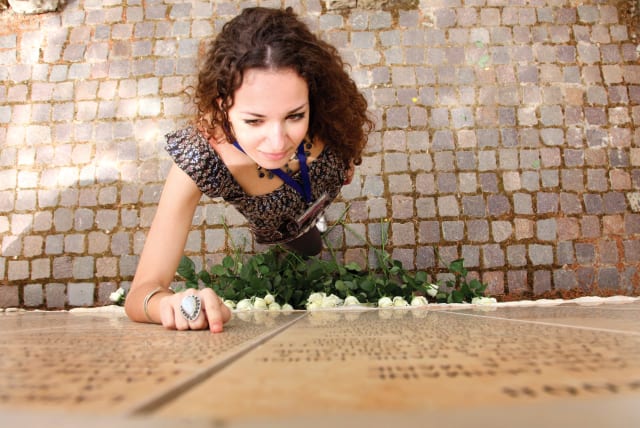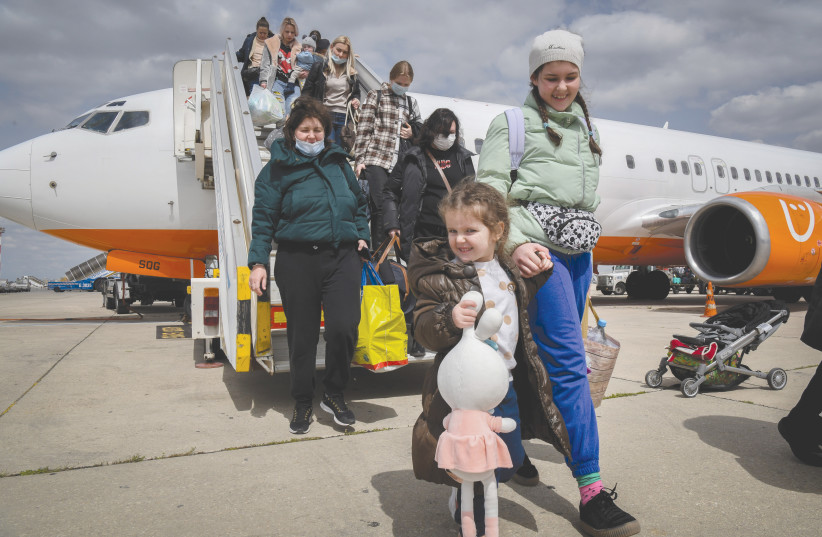Passover: Former Soviet Union Jews finding freedom in Israel

Do Jews who come to Israel find inner freedom or do they become hostages of the situation? I spoke with Jews from the post-Soviet Union who have recently made aliyah.
Now the Lord had said unto Abram, Get thee out of thy country, and from thy kindred, and from thy father’s house, unto a land that I will shew thee – Genesis 12:1
Passover reminds us of the sudden revelation of the divine presence, which allowed the Jews of Egypt to move from slavery to the will of Pharaoh to adherence to the will of God. It is a celebration of freedom.
Today’s aliyah is in a sense another exodus of Jews to Israel and their liberation. Many come here in search of home and new identity. However, some post-Soviet Union immigrants come to Israel not because of a call of the heart but for security reasons. People are fleeing the war and the regime. In a metaphorical sense, they escape from slavery, seeking salvation here. Coming to the Holy Land, they certainly gain freedom from physical threat – the likelihood of becoming a murderer, being killed, committing crimes against humanity and their morality. People are freed from the threat of being imprisoned or forced to live in fearful silence, betraying themselves and their beliefs. Israel is becoming a lifeline, and security is undoubtedly given to all.
But what about inner freedom? Do Jews who come to Israel really find it here, or do they become hostages of the situation, confused about their identity and not understanding who they are now? Do they find their home here or face hostile a environment and oppression? Do they have the opportunity to feel their roots and become part of Israeli society? And, most importantly, do they perceive their arrival as a return?
To answer these questions, I spoke with Jews from the post-Soviet Union who have recently made aliyah. I also described part of my story as a new immigrant who arrived in Israel immediately after the start of the war.
What do Jewish immigrants from the former Soviet Union think about Israel and freedom?
“And do you know what I felt?” a friend of mine asks while talking about how she received an updated passport the other day. “That I left the country where I could be imprisoned for any opinion expressed out loud and arrived in a country where the religious majority does not consider me to be either a Jew or a person in general.”
Malka recalls how a religious man was rude, shouting, scolding and insulting her while dealing with her documents. “I still feel disgusted that I am a stranger to him simply because I was not born in Israel,” she says. “Although I am Jewish and a citizen of this country.”
I hear such stories often and have experienced it myself. Immigrants seem “not Jewish enough” because they are “newbies” in Israel. Officially, everything is done here to help new citizens integrate, but in fact, the attitude is not only condescending but also contemptuous.
“I have lived here since I was 18,” bartender Oleg tells me while making a drink at one of Tel Aviv’s bars. “I served in the army and learned Hebrew. Israel is my home. And yet, I heard a lot of ridicule because of my accent. It is unpleasant to remember, but I was often told that people like us (immigrants) are not needed in this country.”
Oleg’s words reminded me of how in the first months in Israel, even before obtaining citizenship, I heard an opinion that the Law of Return should be repealed. It was scary, weird, and hard. After all, modern Israel is country created by immigrants. So why do those who returned 20 years ago consider themselves more worthy of living here than I? They say that we are useless, do not respect this country, and come to Israel only for documents. And yes, of course, there are such cases, but did the person telling me this directly to my face think of how the daughter of a Jew feels from his words? I was desperately trying to return to my roots, and I wanted to live in the Jewish state and be part of this society. I felt insecure and asked myself, ‘Maybe I really have no place in Israel? Am I not welcome here?’ That person almost made me doubt my decision to stay; but he failed because there was much more behind my decision than his evil words.
Growing up Jewish devoid of Jewish tradition
Like many children of Jews from the post-Soviet Union, I grew up in a family utterly devoid of Jewish tradition. There were no Torah, menorah, or Shabbat candles at home. Men didn’t wear kippot, we never prayed, and no one in my family told me about Jewish holidays, apart from a tiny incident at Passover, which has been a beacon for me for years.
Because of the antisemitism during the war and in the Soviet Union, my great-grandmother Miriam Neifakh had to be called by the Russian name Lyudmila. At home, we called her by the affectionate nickname Kasia. From early childhood, I remember how we talked for a long time. One day I began to ask about the strange crackers she always bought at certain times of the year. Behind closed doors, Miriam told me about a Passover holiday and matzah. I was a child and don’t remember her story well, but I still feel an aura of mystery around our conversation. That mention of Passover and the taste of matzah is the only Jewish tradition I learned from my family.
As time went on, circumstances and people changed, but all my life until very recently, I felt that some piece of me is lost, and where there should be something important, there is a void that I cannot fill with anything. The silence I want to break, and the mystery I want to unravel. A thin voice and instinct led me along a strange path that neither my father, brother, nor any of my relatives and friends followed. Questions throbbed in my head: Who am I? Who is my family? What happened to them? Where are my roots, and what is my purpose?
One day, I decided to have a look at the archives of Yad Vashem. I had never been to Israel and felt no connection with it. In the archives, I found testimonies – sheets of paper filled out by hand. I noticed the address on them – the same place where I listened to the story about Passover and tasted matzah. I saw grandma Miriam’s name and signature. She was 93 years old at the time of her testimony. She kept the memory of her relatives killed in the Holocaust. Even though she never talked about it, at such an advanced age Miriam sent papers to Yad Vashem to preserve the memory of her family.
I couldn’t believe my eyes. Somewhere out there, in distant and hot Israel, in a museum in Jerusalem, people unknown to me performed an absolute miracle for me. I would never have known about it if I didn’t feel the need to search for something about my family. Then I realized that one day I would definitely come to Israel. And while my repatriation happened faster than I had planned, it was a conscious decision based on my connection to Jewish roots and, therefore, to this country. I can call myself an illustrative example of those who, having arrived in Israel, really found themselves and inner freedom. And this feeling of home for me became more potent than any attacks against me in the spirit of the fact that I am not really a Jew (after all, my mother has no Jewish roots) or even a useless immigrant.
My feelings are shared by many of my friends who have always felt like Jews but, just like me, they came to Israel after the Russian attack on Ukraine. “My mother even wanted to name me David in honor of my grandfather, who has always been a model of intelligence, stamina, and kindness to her,” my friend Ilya says. “Due to the antisemitism of the 1990s, my mother was persuaded to choose for me a name that is more common in the post-Soviet Union. Nevertheless, we always felt like Jews. We kept documents and the memory of our ancestors. Yet, having arrived in Israel, I didn’t feel inner freedom. Reflecting now, I conclude that this was due to an emergency departure from Russia. People here seemed to look askance at me because I don’t know Hebrew. Perhaps I thought it out for myself, but the feeling of being a ‘stranger’ did not leave me. Then I realized that no matter what, I must remember that I didn’t just come to Israel. I returned back here.”
Of course, each immigrant story is unique. There will always be those who will never feel any connection with Israel, but there will also be those who genuinely feel like they have returned home to where their heart led them. Being in the country of exodus, they felt like Jews. Unfortunately, some come here to face oppression and hostility in the only Jewish country in the world.
It is important to remember that many immigrants from the post-Soviet Union didn’t have the opportunity to join the Jewish tradition because of the antisemitism that engulfed those areas for many years. People were forced to change their names and were afraid to pass on traditions to their children – to us. We did not have the opportunity to learn more about our roots and culture. But many of us strive for this, overcoming not only the crisis of change of residence, loneliness, financial difficulties, language, and cultural barriers, but sometimes the rejection of fellow Israeli citizens.
This article begins with a quotation from the Torah portion Lech Lecha, in which God appears to Abraham, telling him to leave everything he knows and follow him. God promises Abraham progeny, land, blessings, and protection. Many who come to Israel from the countries where they were born and raised follow the voice within. People move forward, breaking away from the past, former ideals and values. They are forced to go through a difficult path, to rise above pain and hardships because they are driven by an inexplicable internal purpose. Getting to know Judaism more deeply, I understand that following the voice inside and trusting this voice is the basis. Passing through difficulties and trials on this path should not be frightening and can deprive one of faith. This is an integral part of spiritual progress which, like the Exodus from Egypt, cannot be instantaneous and simple. ■
Jerusalem Post Store
`; document.getElementById("linkPremium").innerHTML = cont; var divWithLink = document.getElementById("premium-link"); if (divWithLink !== null && divWithLink !== 'undefined') { divWithLink.style.border = "solid 1px #cb0f3e"; divWithLink.style.textAlign = "center"; divWithLink.style.marginBottom = "15px"; divWithLink.style.marginTop = "15px"; divWithLink.style.width = "100%"; divWithLink.style.backgroundColor = "#122952"; divWithLink.style.color = "#ffffff"; divWithLink.style.lineHeight = "1.5"; } } (function (v, i) { });

